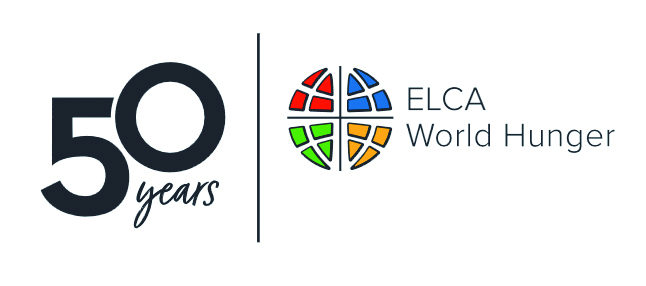- For 50 years Lutherans have joined together to address the root causes of hunger and poverty around the world through ELCA World Hunger. Photo: iStock.com/Bulat Silvia
- Through its partner the Nicaraguan Lutheran Church of Faith and Hope, ELCA World Hunger supports community well-being in La Fragua by providing resources to farms such as Auxiliadora’s. Photo: Courtesy of ELCA World Hunger
- Generation Zero-Hunger, a youth-driven fundraising challenge to support ELCA World Hunger, made a $250,000 offering—alongside other ELCA donors and members—as part of the 2024 Youth Gathering. Photo: Courtesy of ELCA World Hunger
- Photos: Courtesy of ELCA World Hunger
- Photos: Courtesy of ELCA World Hunger
- Since 1974, World Hunger has evolved to address hunger trends, innovation and technology, and global changes. Photo: iStock.com/kuarmungadd
This year the ELCA has been celebrating how ELCA World Hunger came to be and the thousands of donors who have and continue to make its work possible.
Since 1974, hundreds of thousands of people from across the church have contributed more than $650 million to support ELCA World Hunger. The church has made great strides against hunger and poverty, providing food to meet people’s immediate needs and equipping communities to foster long-term change through access to education and quality health care, sustainable solutions in agriculture, and advocacy for just laws that make ending hunger possible.
Fifty years of ministry have increased coordination and common commitment within ELCA programs to address global challenges through local, grassroots efforts. The church and its partner organizations are helping people in communities support one another, using time-tested approaches, enacting a vision of a world experiencing the difference God’s grace and love in Christ make for all people and creation.
World Hunger has created housing solutions, new community gardens and fully stocked food pantries. It has provided microloans to women in India, sheltered refugees fleeing Ukraine and built sustainable farming practices and community collectives in Nicaragua. In this article, Living Lutheran is sharing just some of their stories.
As World Hunger looks ahead to another 50 years of ministry, ELCA members can give thanks for changed lives, bolstered ministries and the ways the church continues to inspire others to join in this work.

Community collective in Nicaragua
Abercio and Auxiliadora (last name withheld) have been married for 30 years and have raised five children. Their farm, El Paraíso (“The Paradise”), is in La Fragua, a municipality in Nicaragua. The couple work diligently in traditional agriculture, primarily planting maize, sorghum and red beans but also raising chickens, pigs and cows.
An World Hunger partner, Nicaraguan Lutheran Church of Faith and Hope (in Spanish, Iglesia Luterana de Nicaragua Fe y Esperanza, or ILFE) works deep in the heart of communities like La Fragua to enhance their well-being. It provides families with livestock, agricultural training and new tools so they can improve their daily nutrition, embrace sustainable farming techniques and increase their earning power.
“I have received training from the Lutheran church, as well as agricultural supplies like seeds, plants and fertilizers,” Abercio said. “Since my farm is located on the banks of the El Gallo River, the project has provided me with equipment to improve my drip irrigation system, which allows me to water a plot where I grow about 300 plantains and watermelons. The truth is, I stay busy because this system allows me to plant and produce crops at any time of the year.”
Abercio loves being a full-time farmer, and he believes that working with ILFE has improved every aspect of his farm. He especially loves how the project has helped his wife manage their poultry. “If there’s something I really love, it’s raising chickens!” Auxiliadora said. “I love having many.”
“I met a woman in Nicaragua the last time I visited, and she said that World Hunger projects were not just changing the way they harvest their fruits and vegetables, but they were also changing the way they, as a family, behaved and shared daily tasks in a more equitable way.”
—Hellen Rios-Carrillo, ELCA regional representative for the Caribbean and coordinator for gender justice
With the help of project staff, Auxiliadora was introduced to a new breed of chickens that can be raised for both meat and eggs. She now knows how to breed and raise these dual-purpose chickens. World Hunger provided the materials needed to build a coop and accommodate a new brood.
“My commitment to this program is to give chicks to another family,” Auxiliadora said, holding a few chicks in her hand. “I have already made my contribution and shared my experience with the family that receives them.”
The family, inspired by the help they received, now dedicates their spare time to contributing to the community through ILFE. They organized a local seed-bank collective where families can sell seeds, buy fertilizer and swap resources. Families who receive help will often turn around and pour that generosity back into their community. Together, with the help of ILFE and World Hunger, they are strengthening their farms and meeting the needs of those who would otherwise struggle to get by.
This story was adapted and translated from materials sent by World Hunger companions.
Affordable housing in Wisconsin
Megan Surfus grew up in Door County, Wis., and is a single mother of two young boys. In 2019, Surfus rented a relatively affordable two-bedroom apartment in Sturgeon Bay, close to work. Each year her rent increased by $50, and as her boys grew, both space and money became tighter. Determined to provide a stable life for her boys, Surfus started the process of homeownership and received preapproval for a loan of $150,000. It wasn’t enough. “Unfortunately, I found that local homes within my budget all seemed to need a ton of work, and I simply didn’t have the time, the skill or the resources to invest into a remodel or project home,” she said.
The national affordable-housing crisis is a prominent issue in Door County, a rural county with a tourism-based economy. Many of the jobs that support working families are in service industries, which generally pay lower-than-average wages. Homes that would otherwise be available to working families are quickly taken off the market by those purchasing second homes or others looking for short-term rental properties. As a result, the few homes available for purchase are unaffordable for working families.
As people of faith, members of Shepherd of the Bay Lutheran Church, Ellison Bay, Wis., believe that they are called to address these community challenges. Since Jim Honig began his call as the congregation’s pastor seven years ago, he has been active in the community, forging relationships with other citizens and organizations that work to help residents thrive.
Honig joined a handful of other citizens to form the Door County Housing Partnership (DCHP), a nonprofit that uses the community land trust model to provide homes for working families. With carefully derived pricing and resale formulas, and restrictions on subsequent purchases, the organization provides an affordable home not only for its first buyer but for every family that purchases it thereafter, which impacts families for generations. World Hunger partners with Shepherd of the Bay, Honig and the DCHP in their work to make homeownership a reality for people like Surfus.
“Thanks to ELCA World Hunger, we are able to partner with many other organizations in Cairo to help bring dignity to the lives of the most vulnerable. Refugees who are at StARS are often young people, including unaccompanied minors.
“ELCA World Hunger makes possible programs in literacy, health care, psychosocial support and education. There’s something amazing about seeing dignity return to the lives of individuals who have lost so much due to conflict and war.”
—Bekah Davis, St. Andrew’s Refugee Services (StARS) chaplain, St. Andrew United Church of Cairo
Surfus found a DCHP house for sale in her area. “It could not have been a better fit for my little family: a brand-new, three-bedroom home, located just minutes away from my work and the school where my kids attend, and priced within my budget,” she said. She submitted an application, attended the open house and met Honig, who answered her questions and spoke about the housing partnership and the need for affordable housing.
Surfus knew she would eventually be priced out of her apartment. The DCHP property had several interested buyers, and she worried that she and her boys might not be chosen. But later that fall, she received notice that her family could move forward with the purchase of the home.
“The mortgage I pay every month is cheaper than what I was paying in rent, allowing me to invest and save for the first time in my life,” she said. “My children have a quiet and safe neighborhood to play in. … I can continue to live and work in the area where I grew up, where my family and support system are all located. … [My kids] can continue to grow up in a healthy home and stable environment.”
Through its partnerships, World Hunger is able to address the ongoing housing crisis for families through creative and long-term solutions.
“Looking back, becoming a homeowner was well worth the process,” Surfus said, “and it would not have been made possible for my family without the care and commitment of the board members of DCHP, and those who have donated and helped sponsor DCHP. This has truly been a blessing for us.”
ELCA World Hunger: The next generation
Over the summer, thousands of young Lutherans attended the ELCA Youth Gathering. World Hunger played a role in the Gathering’s Interactive Learning Center, promoting the “Generation Zero-Hunger” campaign. Implicit in the name is the idea that Generation Z will be the one to end hunger.
In the center, participants took an interactive journey that helped them understand what it’s like to face food insecurity. They also learned about World Hunger partners in the United States and Nepal that address the root causes of hunger.
Ashlyn (last name withheld), a Gathering attendee, participated in the interactive journey. “I learned about the uncertainty that comes with food insecurity, and how we can’t change the entire world but we can be a part of the work in creating a better world,” she said. “My church donated $1,500 [to World Hunger], so it was really cool to really understand where our money is going and how it’s going to help the community.”
Generation Zero-Hunger was an opportunity to introduce youth to World Hunger or teach them more about a ministry they were already involved in. Youth groups and congregations around the country raised nearly $100,000 to support World Hunger programming and brought it to the Gathering. A group of donors had agreed to a matching goal of $250,000, and with the help of other ELCA members, the youth reached that goal.
“The impact that ELCA World Hunger has had in transforming the lives of people in Indonesia, in Cambodia, in India, in Nepal, has been tremendous. And when I traveled and watched and met these people, I see the impact the church, through the gospel, has made in their lives.”
—Chandran Paul Martin, ELCA regional representative for Asia
“This year is the 50th anniversary, and our congregation has been deeply invested in the work of ELCA World Hunger, so we’ve got a congregational goal to raise $50,000 for the 50th anniversary, and our youth wanted to be a part of that,” said Jonathan Schnibben, a pastor of Grace Lutheran in Hendersonville, N.C., who attended the Gathering with youth from his congregation. “It was so great to let the youth be leaders in the congregation, to challenge all of those older adults in the congregation to help raise money to help feed neighbors in need.”
Since 1974, World Hunger has evolved to address hunger trends, innovation and technology, and global changes. When reflecting on the past and future of World Hunger, Fred Milton, a member of the ELCA World Hunger network since the 1990s, said, “My hope is that we continue to do what we’re doing, that we expand the sense of advocacy and interagency work that has helped bring us to this place of improvement. Fifty years from now, I hope there’s no more global food needs.”
The same hope, activism and passion for justice that World Hunger inspires is being passed from older generations to younger ones.
Motivated by her work as an ELCA World Hunger Advocacy Fellow, Erin Brown expressed her aspirations for the next 50 years and beyond: “I hope to see this community, ELCA World Hunger, continue to grow, but also adapt and think about new ways in which we can be church and community together in a world that is changing, but that the impact stays the same. That we continue to do this really important work and do it with love.”
Ministry partnerships
ELCA World Hunger works alongside other ELCA ministries, such as Lutheran Disaster Response (LDR) and ELCA Witness in Society (advocacy), to address the root causes of hunger.
Lutheran Disaster Response
World Hunger and LDR complement each other in their work. World Hunger supports projects, such as climate-smart agriculture, that better prepare communities to withstand disasters. When those same communities experience setbacks due to disaster, LDR assists in both short-term relief and long-term recovery. Support from LDR strengthens existing relationships between communities and World Hunger.
Juba, South Sudan, is one of the communities where World Hunger and LDR collaborate. They both support the local Reconciliation Lutheran Community Center and Primary Health Care Clinic. World Hunger supports clinic services, from maternal health and child health to chronic health conditions. LDR provides additional support for specific and urgent needs, such as annual fistula camps. Women in South Sudan face high rates of fistula due to a lack of maternal health services, so these camps provide emergency care for women across the country.
Since Russia’s invasion of Ukraine in 2022, LDR has been accompanying Ukrainian refugees throughout Central and Eastern Europe as they seek to settle into host communities. Similarly, World Hunger assists refugee centers in countries such as Serbia, with an emphasis on empowering women and young people as they integrate into the community. At the refugee centers, women develop job skills and children have educational opportunities.
ELCA advocacy
Advocacy has played a key role in the work of World Hunger. One way World Hunger advocates on behalf of those in need is by supporting the ELCA World Hunger Advocacy Fellows program. Participants receive a one-year fellowship at ELCA advocacy offices or state public policy offices across the country. During their time, fellows participate in advocacy work, including meeting with elected officials, interacting with advocacy networks and sharing their experiences with the wider ELCA.
By supporting the advocacy fellow program, World Hunger offers young people the opportunity to integrate professional development and their faith.
World Hunger advocates on the international level as well, with delegations attending events like the United Nations Climate Change Conference and the United Nations High-Level Political Forum on Sustainable Development. World Hunger representatives have the opportunity to hear stories, meet leaders from around the world and connect with other advocates.
Generation Zero-Hunger, a youth-driven fundraising challenge to support ELCA World Hunger, made a $250,000 offering—alongside other ELCA donors and members—as part of the 2024 Youth Gathering.
Through its partner the Nicaraguan Lutheran Church of Faith and Hope, ELCA World Hunger supports community well-being in La Fragua by providing resources to farms such as Abercio and Auxiliadora’s.
“What our accompaniment means as the ELCA through World Hunger is that we go into places in mutual relationship, a partnership, to empower local leaders, because they’re the experts on the ground who know what their communities need and have the gifts to do it.
“ELCA World Hunger increases the capacity and ability of these amazing, beloved co-workers of the gospel to do ministry that changes people’s lives. From places such as the Holy Land to the communities I serve in the synod, World Hunger is there, creating long-term, sustainable conditions for the abundant life that Jesus came to give.”
—Meghan Johnston Aelabouni, bishop of the Rocky Mountain Synod and former missionary in Jerusalem and the West Bank
To help
The world produces more than enough food to feed every person, yet the number of people who are hungry has grown since 2019. More than 2 billion people around the world aren’t sure where their next meal will come from, and for as many as 820 million people, that next meal won’t come at all. For more information or to help, visit elca.org/hunger.













